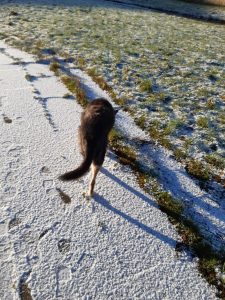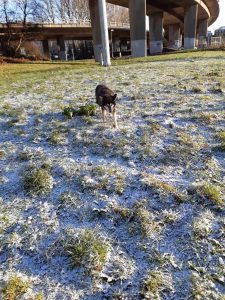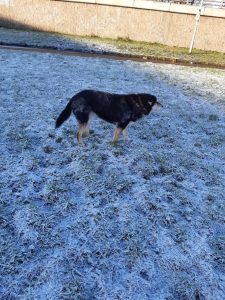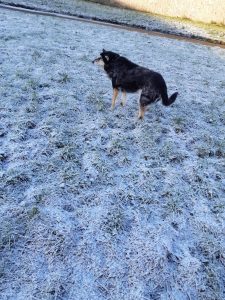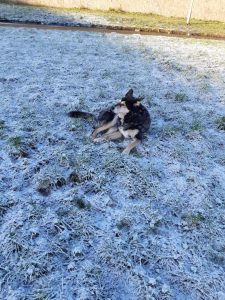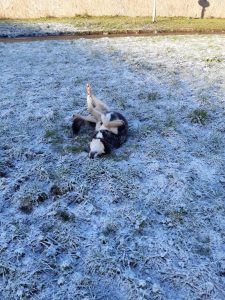I recently got a comment from a reader who was feeling pretty hopeless about our future under climate change. Whether you’re thinking about the ways that higher temperatures will hurt agriculture, the direct human impact of ever-worsening heat waves, mass migration from rising sea levels, or the oceanic collapse that seems to be the likely outcome of rising temperatures and acidity, it’s easy to feel like the future is just going to be endlessly escalating misery, leading to extinction. As this introduction may have indicated, I am not immune to those fears. I think there’s a degree to which despair is the most logical conclusion when faced with the scale of the problem; even more so when you consider the ways in which the global political and economic landscape seems almost designed to guide us to the worst of all possible futures. It’s the biggest problem ever faced by humanity, at a time when it feels like all the resources we need to respond to it are committed to stroking the egos of the ruling class.
I’ve mentioned before that the original purpose of this blog was to provide a bit of perspective on what the worst-case scenarios of climate change looked like. At the time, activists I interacted with were still mostly caught up in the idea that we could somehow prevent the climate from changing in any major way, and those not active on the issue seemed to think it was a problem that could be put off for a century or two. The problem with researching worst-case scenarios is that it’s easy to feel that it’s all hopeless. It also made it easy to see how, once denial became impossible, those who wanted to prevent a systemic response to the problem would switch from “it’s not happening” to “there’s nothing we can do about it”.
Denial and doubt are powerful demotivators, but I fear they’re downright harmless when compared to despair.
With all the focus on the myriad of ways in which our future was likely to be horrible, there were definitely times when it seemed like there was no way out. In trying to deal with that, I struck on a metaphor that still resonates with me. It’s not hard to spark fear, and cause people to run away from a threat. The problem is that the future is unfamiliar territory. If you start fleeing for your life, and you don’t know where you’re going, the odds of going the wrong way are pretty high. You might run into a dead end, or toward an even greater danger. If you have some prospect of safety, however, you can run with that in mind.
I don’t just want to tell people what they need to avoid, though we should never forget that aspect of the situation. I want people to have some notion that running away can lead to more than just surviving until we can’t run anymore. The future doesn’t have to be terror, misery and death, if we work now to build what we’ll need for safety, community, and joy.
We need to build something that has never been built before, and it’s hard to get people to join in an effort like that if they can’t see what that has to offer. As it stands, the choice is less between good or bad futures, and more between two unknowns. Even as more and more people become convinced that one path leads towards hell on earth, if the other path leads into darkness, it’s not hard to imagine that it could be worse.
And we have people whose full-time job is telling us about all the horrors that might lurk in that darkness. Now that a lot of folks have realized that the planet’s going to keep warming, probably for generations to come, it now seems like the dark path is not just unknown, it’s the unknown plus all the horrors of the path we can see more clearly.
So, if I want to help people take action on climate change, and work with me to build a better future, I can’t just tell them what we’re avoiding. Blind panic won’t do us any good – it’s just as likely to lead to people seeking out the “comfort” of totalitarianism. Maybe more likely. What we need is to convince people that a better future is within our reach – that something different is possible, and good. The future is, without question, going to be terrifying in a lot of ways. But there’s a very real possibility that it could be wonderful, if we’re able, as a species, to stop clinging to the past and commit ourselves to something better.
“If you want to build a ship, don’t drum up people to collect wood and don’t assign them tasks and work, but rather teach them to long for the endless immensity of the sea.”
-Antoine de Saint Exupéry
It’s tempting to compare the emotional reaction to climate change with the challenges of coping with depression. When you’re suffering from depression, it’s a bit like being stuck in thick fog. Even if you know it’s not your fault that you’re there, and that there are other people there with you, you still can’t see anything but endless, formless gray. The difference is that because other people have found ways to treat depression, and overcome it, we can hear voices telling us that the fog isn’t endless. There’s a way out, and they can try to help us find it. It gives us something to work towards.
When a country faces a problem like America’s nightmarish healthcare system, we can look to other countries, and see how they’ve tackled similar problems. We can see that there are better ways to do it. We can talk to people who’ve experienced both systems, and hear about the differences. We have something concrete to work towards, and the knowledge that even if the general solution is the same – universal healthcare – we can do it in our own way, if that’s important. We can try to do what others have done, and to improve on it.
Climate change is global, and there’s nobody on the other side of it. We’re all in the fog together, some people have discovered that the water’s rising, and told us which way is likely to lead to higher ground, but nobody can really see it, or claim for certain that it’s there. Nobody’s been there, and some people seem convinced that the water’s not rising, the higher ground doesn’t exist, and if we go looking for it, we’ll fall off a cliff or get eaten by monsters hiding in the fog.
We need to organize all of humanity to do something that’s never been done before. While I think it’s important for me to write about climate science, it may be more important for me to take a more speculative approach. I have a vision – or a hundred visions – of what a better future could look like, and it’s my job to try to share that with other people, and work with them to sort through the myriad of possible futures, and to work towards those that seem best. It’s difficult to do, because I don’t know what the future will look like either, and it’s much easier to conjure an image that strikes the viewer as impossible than it is to conjure one that we can believe is within our reach.
I also want to do that without misleading anyone about the gravity of our situation, or the difficulty of the work ahead.
“The challenge of modernity is to live without illusions and without becoming disillusioned … I’m a pessimist because of intelligence, but an optimist because of will.”
-Antonio Gramsci
It’s common, in atheist circles, to point out that one cannot choose one’s beliefs. It’s not really possible to simply decide one day that you will begin to believe something. That said, I think it is possible for us to indoctrinate ourselves to some degree. That’s the truth behind the advice of “fake it till you make it” sometimes given to those who don’t believe but feel they should. If you’re surrounded by people who reinforce a certain belief, and you keep reinforcing it to yourself, you may come to actually believe it in time. This trait leaves us vulnerable to propaganda and malicious indoctrination campaigns, but it is also a tool that we should be able to make use of, not to mislead ourselves, but to convince ourselves of things that we may know to be true, without feeling to be true.
I’m not sure, but I think the version of this with which the most people are familiar is fear of the dark. For all the rational reasons behind it, there are times when that fear is, quite simply, not founded in reality. And so when forced to cope with darkness, many of us have resorted to reminding ourselves that there’s nothing to fear, or spinning narratives that cast the goblins of our imagination as incompetent, or having to follow strange, arbitrary rules that will provide us with safety if we step carefully.
Because darkness is something most people have to deal with from time to time, most of us learn to lose our fear of it, or to cope with that fear if it never goes away.
Similarly, I think there’s good evidence that we can not only survive climate change, but that we can build a world that allows us to thrive despite it. I do actually believe that, most of the time. The biggest obstacles are political, hence the frequency with which I write about politics. In this area, I think there’s also cause for both pessimism and optimism. Massive political changes have occurred throughout history, even against obstacles that seemed insurmountable.
“We live in capitalism. Its power seems inescapable. So did the divine right of kings. Any human power can be resisted and changed by human beings. Resistance and change often begin in art, and very often in our art, the art of words.”
As hopeful as that quote is, it’s also worth remembering that most of the changes that can be compared to what’s needed today were not peaceful changes. Those who make the accumulation of wealth and power their life’s work are rarely willing to just give that up, and would rather destroy everything than lose their power over other people. That is dangerous, particularly in a world with so many tools and weapons available to the powerful. That said, their power still relies on the general population. I think overcoming global capitalism is necessary for humanity’s survival, and while that is a profoundly dangerous project, it is also entirely within our power. The fact that the capitalist class spends so much money convincing people that change is impossible, is an indication that they really do need to have most of the population either opposed to change, or unwilling to commit themselves to it. They’re willing to let go of some of their hoards to keep us passive, because they know that without our consent, they will not be able to keep those hoards.
That means that just as a better future is technologically possible, it is also politically possible. The question is figuring out how to make it happen. There’s a degree to which studying things like the labor movements of the late 19th and early 20th centuries, and the socialist and communist movements of the same era can provide us with many useful ideas, but the world has changed radically in the last few decades, and both the obstacles to change, and the available tools were unthinkable during those movements. There is no perfect formula that will solve the problem. While we need global change, we also need to accept that the exact form of that change is going to look different in different parts of the world. Humanity is too contrary and diverse for a one-size-fits-all approach. That said, we’re also all the same species, and more similar than we often think.
One size won’t fit all, but a basic pattern can be adapted to suit a wide variety of needs. I don’t think any one person can design that pattern, so my approach has been an attempt to piece together an eternal work in progress from the efforts and expertise of others.
If you’ve read this far, you’ve probably noticed that I’ve moved from talking about the emotions surrounding climate change, to the kinds of work we need to be doing. There’s a reason for that. It’s a lot easier to feel like something is possible when you’re actively involved in working to make it happen. The problem is that for really big problems, we often don’t know where to even start, and it’s hard to see how the miniscule accomplishments of a single person, even working for an entire year, can make a difference. That’s the other aim of the direct action piece I just linked – while I believe that it can form at least part of the foundation for a global change, it’s also designed to provide the means for individual and community-level change. It helps me to know that if the grocery store runs out of food, I can feed my household for a while, as we figure out new sources. Even more, it helps me to know that I can help to feed my neighbors, so that we’re all able to work together toward solving that problem.
And I also know that I can convince others to accumulate a store of food for the same reasons, which further extends our ability to survive as a group. Focus on the things you can change personally, not because that’s enough, but because it puts you in a better position to tackle larger changes, and because it can connect you with others who are doing the same work. Do the work where you live, and I will do it where I live. Communicate with those around you. Communicate with those, like me, who live hundreds, or thousands of miles away. In the last few years I’ve helped people I will probably never meet, and been helped in turn. It gives me hope to see people contributing a little to the work I’m trying to do, not just because I like being able to make ends meet, but because it also means that they are doing well enough themselves that they’re able to do so. It gives me hope to know that there are people reading this blog in the US, and in Europe, and in Australia, and in other parts of the world, because that means that even with my tiny audience, there is a network of people who are at least thinking along similar lines, while they read these words. The problem is global in scale, but so is our ability to respond to it.
My direct action plan is not enough. Not nearly. But neither is it the only effort at dealing with the problem. My plan isn’t even “mine” – it is, itself, a collection of the efforts and thoughts of other people, in other parts of the world, who are almost certainly doing more than I am.
My “pessimism of the intellect” comes from a sober analysis of our circumstances. My “optimism of the will” comes from reminding myself, day after day, that there are people all over the world who are working on this problem, and who are helping others to do the same right now.
I would honestly be shocked if the planet didn’t continue warming for the rest of my life, but, self-indoctrination or no, I also believe that we can build lives worth living for an ever-expanding proportion of humanity as part of our effort to survive that warming.
This blog is currently my only source of income. If you’d like to support the work I do, feed my dog, or help offset the costs of our upcoming move, please head over to patreon.com/oceanoxia, and join the Oceanoxia collective. My patrons have kept my household fed and housed during this crazy year, and while I’ll continue looking for wage labor, I really like writing for you all, and would love to be able to continue dedicating most of my time to that endeavor. If you have the means and the desire to do so, please give according to your ability, that I might survive, according to my needs!

